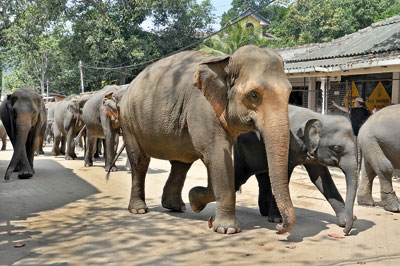News
FEO condemns rampant abuse of captive elephants and wildlife
The Federation of Environmental Organisations (FEO) has asked government authorities to enforce laws to prevent the abuse of captive elephants and protect wildlife.

Pinnawala: Making money on the backs of orphaned elephants says FEO
The FEO said it was calling on the relevant authorities – the Ministry of Sustainable Development & Wildlife, the Department of Wildlife Conservation (DWC), the Ministry of Tourism, the Attorney General’s Office, the Police, and others – to enforce the laws.
“Just within this past fortnight, all forms of the media in Sri Lanka have carried articles and pictures on the consistent and open abuse of captive elephants – from elephant races, to an elephant in a tug-of-war with a team of people, and other such demeaning activities that such noble animals are being forced to do,” the FEO pointed out.
The organisation said, apart from the ignominy of being forced to do such ‘unnatural’ activities, they are unethical.
“As per the law, all owners of captive elephants must have a licence from the DWC, not only for the possession of these animals, but also for any use to which they are put. Now that the era of working elephants is over, the only legal function they are permitted to be used for are in religious processions – peraheras – as per tradition,” the FEO said.
The FEO believes that, “even with this, such permission should only be granted to those temples set up by an ancient royal edict, the Raja Maha Viharayas, as a historical privilege, and not ad hoc to each and every establishment, even to those of recent foundation.”
“Sri Lanka is rapidly developing a bad reputation internationally, due to its treatment of its animals, both wild and captive. Tourists are being warned to avoid the Pinnawala Orphanage, because of the alleged poor treatment of the elephants there. What was once a place of worldwide acclaim for its successful breeding programme, it has now become little more than a money-making scheme; all on the backs of orphaned elephants,” the FEO added.
They said the National Parks, particularly Yala, are now gradually being avoided due to the massive over-visitation to them.
“It is a horrible experience for both, nature lover and for the animals, subject to it. Whale-watching is rapidly turning into ‘whale wrangling’ as there are no controls at all imposed in the sea, with some tour operators even encouraging divers to swim with the whales; a disaster in the making,” the FEO said.
“Where once Sri Lanka attracted its visitors for its pristine beaches and wildlife, it is now beginning to repel them due to the harsh treatment of its animals, both captive and wild,” they said.
The FEO pointed out that the Tourist Board needs to take account of this, and be more proactive in influencing positive change.

